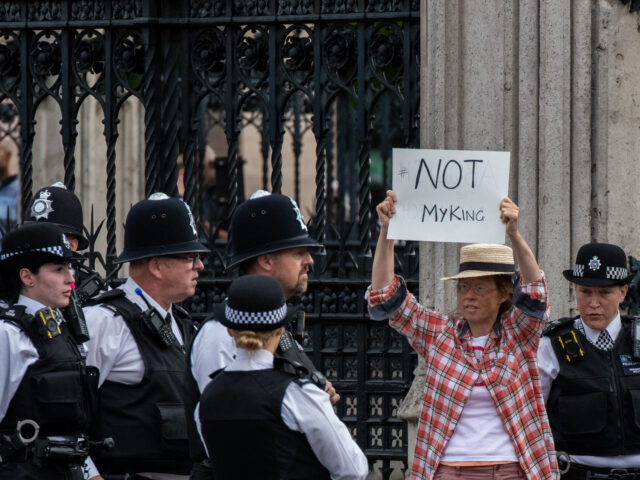The liberal establishment media in Britain has finally feigned interest in protecting free speech from the police following a string of highly publicised arrests of anti-Royalist activists during the mourning period for Queen Elizabeth II.
After largely overlooking overzealous police forces throughout the UK engaging in a serious crackdown on political speech in recent years, leftists on social and the legacy media have apparently woken up to the dangers of having police forces decide what is permissible speech.
The alleged damascene conversion to the cause of free speech came in the wake of a small number of high-profile arrests of protesters during the transfer of the British crown to King Charles III and the mourning period for his late mother, Queen Elizabeth II, who died at the age of 96-years-old last week.
On Sunday, a 22-year-old-woman was arrested outside St Giles’ Cathedral in Edinburgh during an accession proclamation for the King while holding a sign reading: “Fuck imperialism, abolish monarchy”. She was arrested for allegedly breaching the peace. The following day, a 22-year-old man was arrested while heckling Prince Andrew over his ties to Jeffery Epstein during the procession along the Royal Mile in Edinburgh.
The man was officially charged with breach of peace on Tuesday, with Police Scotland saying: “He was released on an undertaking to appear at Edinburgh Sheriff Court at a later date and a report will be sent to the Procurator Fiscal.”
Also on Monday, barrister and climate activist, Paul Powlesland, shared footage on social media of him apparently being confronted by a police officer in Parliament Square while holding a blank sign, on which he told the officer he was planning to write “not my King”.
“You said you were going to write stuff on it that may offend people about the king,” the officer said while demanding the activist divulge his details.
Another woman was seen being moved by a group of police while holding a sign outside parliament prior to the King’s arrival at Westminster Hall while holding a sign saying “Not my King”, however, the Met claimed that she was removed for blocking the gate entrance, not for her sign.
The arrests and police actions against republican (anti-Monarchist) activists have caused a sudden string of articles from the legacy media including the BBC and the Press Association, highlighting concerns over attacks on free speech.
The PA article highlighted far-left Labour MP Bell Ribeiro-Addy who said: “People are being arrested for expressing their opposition to unelected, hereditary power.
“If this was happening in Russia, the Government would be denouncing it on the international stage. Instead, they’re pushing ahead with further legislation to curb our right to protest.”
The BBC said that the “arrests of protesters prompt free-speech concerns”. The tone of the article was markedly different from the public broadcaster’s coverage of the arrest of a British Army veteran over an allegedly offensive meme shared on Facebook, which was exposed by My Son Hunter star Laurence Fox in July.
Rather than highlighting the “free-speech concerns” of the incident, the BBC chose instead to focus on the Conservative Police and Crime Commissioner Donna Jones criticising the Hampshire Constabulary and shutting down a woke ‘Hate Awareness’ programme conducted by the force. The words “free speech” were not included in either article.
Demonstrating a more consistent stance on the issue, Laurence Fox’s deputy leader at the Reclaim Party, Martin Daubney said in response to one of the anti-Royalist police incidents: “Once again, why are the police getting involved in this? He is entitled to say “not my king”. His timing is off, he’s being hugely disrespectful – but we all have a right to be offensive.”
While the concept of freedom of speech was first solidified in Great Britain, over the past two decades, police have become increasingly active in monitoring speech, particularly following the passing of the Communications Act by the left-wing Tony Blair government in 20003. The law has resulted in the arrest of thousands of citizens for being “grossly offensive” or intentionally causing “annoyance, inconvenience or needless anxiety to another”.
While freshly-installed Prime Minister Liz Truss has made some statements calling on the police to focus on actual crime, there has been no indication that her government will look to repeal legislation that restricts speech. Indeed, the allegedly small-c conservative leader will reportedly look to press on passing the Online Safety bill, which campaigners have warned will only see more limits placed on expression in the UK.
Follow Kurt Zindulka on Twitter here @KurtZindulka

COMMENTS
Please let us know if you're having issues with commenting.